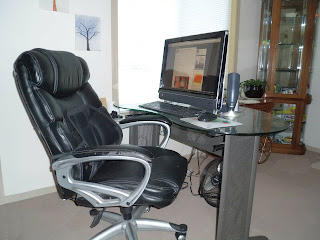Shelved in Shepshed
By Val Culley
Sallie knew
it was going to be ‘one of those days’ before the library had even opened
to customers that cold Thursday
afternoon.
She was
kneeling in the entrance porch, emptying the returned books customers had
posted into the drop box, when she became aware of a large woman standing over
her. “Can you look a book up for me on your computer system? I can’t see it on
the shelves,” the woman asked.
Sallie had
never been a big fan of the concept of the Smart Library, which was introduced
soon after she started work at Shepshed Library. It had taken her a while to
find another job after being made redundant from the library she had worked at previously.
She had then encouraged her former colleague, Jo, to apply for a job at
Shepshed Library as well.
Sallie and
Jo had both now got used to the customers, with their little quirks, such as Mr
Austin, who used the computers but never took a book out, who would come up and
mutter things to them. They would smile and nod but feel uneasy, knowing neither what he had said nor what they were smiling about.
 |
| "Sallie and Jo had both now got used to the customers, with their little quirks" |
Sallie
didn’t like the thought of customers letting themselves into the library when
there were no staff present and doing whatever they liked, having simply signed
a vague agreement to ‘look after the
library,’ but she had no choice other than to go along with it.
She
occasionally had clashes with Smart customers, who pounced on her as soon as she
arrived and vented their frustration at her, because they had been unable to work
the computer, or print documents, with no staff present. When she pointed out they
had signed up to use the library without staff assistance, they would unleash a
tirade of abuse at her.
On this
occasion, she stood up, in as dignified manner as possible, but found she was
still at a disadvantage, looking up at the tall woman, who had long,
untidy grey hair and large glasses.
“We’re not
actually open yet,” Sallie pointed out.
The woman
gestured impatiently. “I’m sorry! All I’m asking is for you to do your job! But
I’m not surprised by your attitude really, because, can I just say, I have
never felt any warmth in this library.”
“That’s
strange because I just found a note on the counter from a customer complaining the
library was too hot while she was using it in Smart this morning.”
“I didn’t
mean that! I meant that the staff here are not at all friendly.”
“None of
them?”
“Yes, none
of them. I’ve never felt any warmth from any of the staff.”
Sallie
looked at her carefully. She was sure she had never seen the woman before. “Do
you perhaps only use the library when there are no staff present?”
“Oh, for
goodness sake. You’re useless. I’m wasting my time talking to you. I shall
complain to the manager.” She marched to the doors, which opened automatically
to let her out.
 |
| "The usual wave of people approached the desk, clutching their phones" |
They made a
good team. Jo was petite with short dark hair and an elfin face and was very
kind, while Sallie was taller and more generously built, with blonde hair and blue eyes and the
ability to be firm but fair with customers. The third girl on duty, Lauren, a
young, library assistant with long, glossy, brown hair, was doing her best to try
to shelve the mountain of books in danger of falling off the returns trolley, flicking her hair
out of the way constantly.
Sallie
noticed Paula was waiting in the queue. Paula was a Reading for Community Health
volunteer, who had started to use the meeting room at the library to help
adults with literacy problems. The staff had agreed to keep an eye on her when
she was in the meeting room with a client and she could call on them for
assistance if she had any problems.
Sallie unlocked
the door of the meeting room for her and propped it open with a door stop so
they would be able to see Paula when they were shelving non-fiction returns.
She noticed that Paula, whose long, mousey hair was scraped back into a pony
tail, looked thinner than ever and her eyes were red rimmed as though she had
been crying.
“Are you
okay, Paula?”
“Yeah, I’m
all right, thanks,” she replied listlessly
An old man
barred Sallie’s way as she attempted to walk back to the counter. “Do you have
a book called ‘The Soldiers of Shepshed’?”
“Yes, it’s
with the local history books along here,” Sallie said
But when she
searched the shelf where it was kept, she couldn’t find it. Worryingly, the
book appeared to be missing. There were only two copies of ‘The Soldiers of
Shepshed’ in the entire county. Sallie had made the Shepshed copy available as
Reference only, so that it couldn’t be taken out of the library. It seemed to
have disappeared and she was concerned someone might have stolen it. A customer
had told her the book was now out of print and there was only one copy left on
Amazon, for which the seller was charging £150.
 |
| "But when she searched the shelf where it was kept, she couldn't find it" |
Sallie
sighed. “Do you mean the Smart Library?”
“I don’t
know. I just want to be able to get in.”
“Get in
where?”
“The
library.”
“You’re in
it now.”
“I know that,
but this morning there were people inside when I went past and when I tried to
get in, I couldn’t.”
“Have you
joined the Smart Library.”
“Yes, of course.”
Sallie took
the man’s card and went to the desk and after checking on the computer found he
wasn’t yet registered as Smart.
“Can I
become Smart?” he asked.
Sallie was
just about to say that she thought it highly unlikely, when a shrill scream came
from non-fiction. Then Lauren ran to the counter looking terrified. ‘It’s Paula!
She’s dead!”
Sallie and
Jo raced to the meeting room where they found Paula, slumped lifelessly in her
chair with red marks on her neck.
The next
hour seemed to go by in a blur. They closed the door of the meeting room, called
the police, and rang their supervisor. Two uniformed officers arrived and said it
looked as if Paula had been strangled. There was no murder weapon in the meeting room, but they
could see that a length of cord had been cut from one of the window blinds.
The first
detective to arrive was taken to the meeting room by Sallie to join his
uniformed colleagues. He said: “I expect your prints will be all over
everything by now. Why haven’t you sent all the customers home and closed for
the day?”
 |
| "Two uniformed officers arrived and said it looked as if Paula had been strangled" |
Lauren was
still very shocked, so Jo made her a cup of tea. They all sat in the office
together and thought back about the events of that afternoon.
Sallie remembered
opening the door of the meeting room to admit poor Paula. Jo remembered seeing
Paula’s client arrive. She said he was tall and looked as though he was dressed
for going skiing and was wearing a hat and had a scarf over his face. He had
walked towards the counter purposefully, but then suddenly turned right and gone
straight to the meeting room. None of them had seen the client come out afterwards.
Later, an
older detective arrived to take over, and said Sallie could open the front door
again. He put one of the uniformed men on the door and asked him to take the
names of customers as they left and he sent the other uniformed officer and the
patronising, young detective away to make further enquiries.
Sallie showed
him the crime scene and explained what Paula was doing in the meeting room. The
detective was tall and thin, with grey hair, and Sallie thought he had an
intelligent face. She relayed her version of events to him, and then he spoke to
Jo and Lauren in turn.
When the pathologist
arrived, the detective took him into meeting room and they viewed the body
behind closed doors.
Later, Sallie
and Jo were both behind the counter when they saw Paula’s client come back in
and walk purposefully towards them. They both gasped with excitement, but he just
asked calmly if he had left his bag next to the kiosk. Jo recovered quickly and
told him a bag had been handed in. She asked him to describe his bag and Sallie
offered to fetch it from lost property.
 |
| "Sallie noticed Lauren, who had somehow managed to change into a little black dress" |
A wedding
picture of Paula and her husband had been in the lounge and the officers had texted him
an image of it, which he showed to Sallie. “But her husband’s been in the
library this afternoon! I saw him earlier, rummaging about among my Mary
Baloghs!” Sallie exclaimed.
The
detective ordered the uniformed officer to search the area around the Mary
Balogh novels. To Sallie’s horror the cop heaved piles of books off the shelves
enthusiastically. Then he brought ‘Soldiers of Shepshed’ to Sallie, which he
had found at the back of the shelf, saying: “I’m no librarian, but this don’t
look like romance to me.”
The uniformed
officer then found a piece of blind cord and the detective took it into the
meeting room to compare it with the cord on the window blind.
On her way to
the shelves again, Sallie noticed Lauren, who had somehow managed to change
into a little black dress with a side slit, was dancing a tango with the uniformed
cop near the audio books. This shift is becoming more and more bizarre, she
thought.
The nice detective
came to thank Sallie for all her help. He said: “We’ll get that poor girl’s
murderer bang to rights. It’s a classic domestic. There’s no one else in the
frame, so we’ll soon have him in custody. I hope you don’t mind me saying this,
and I’m sure people must have said it to you many times before, but you have
the most beautiful, blue eyes. When you’ve finished work, would you be kind
enough to join me for a drink so I can go over my notes with you to make sure I
haven’t missed anything.”
“But I thought
it was an open and shut case,” Sallie said.
“Well, it’s
more a case of murder by the book,” he said, looking into her eyes. He held his
hand out to her and she found herself reaching out to him as well, but then there
was a loud thud…
Sallie woke
with a start and saw she had dropped her book on the floor. She had fallen
asleep while reading in front of the fire. Her black cat was curled up on the
sofa next to her and there was a half empty glass of wine on the coffee table. “Oh
dear, I must have dreamt the whole thing,’ she said, stroking the cat, who purred
contentedly.
“Do you
think it’s time I retired from the library, Desdemona?”







